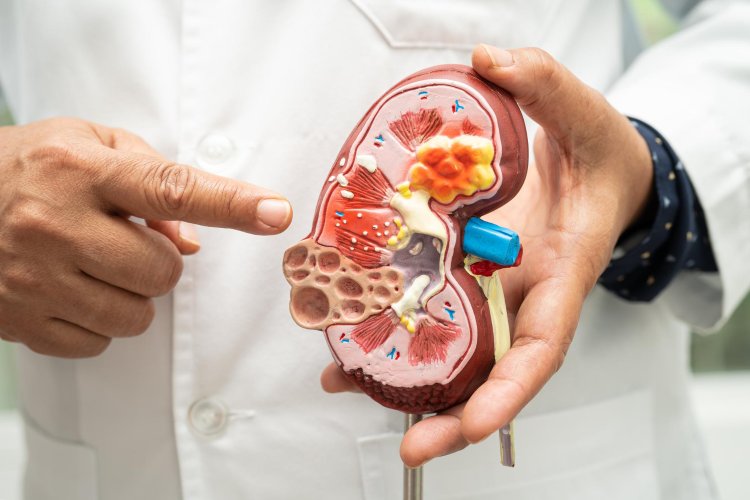Polycystic Kidney Disease: Diagnosis, Management, and Treatment Options
Polycystic Kidney Disease (PKD) is a genetic disorder characterized by the growth of numerous cysts in the kidneys. These cysts are fluid-filled sacs that can enlarge the kidneys and interfere with their function, potentially leading to kidney failure. PKD exists in two main forms: Autosomal Dominant Polycystic Kidney Disease (ADPKD) and Autosomal Recessive Polycystic Kidney Disease (ARPKD).

What is Autosomal Dominant Polycystic Kidney Disease?
ADPKD is the more common form of PKD and typically manifests in adulthood, often between the ages of 30 and 40. This form of the disease is inherited in an autosomal dominant manner, meaning that a mutation in just one copy of the responsible gene (either PKD1 or PKD2) from one parent can cause the disease.
Causes of Polycystic Kidney Disease
PKD is caused by genetic mutations:
- ADPKD: Caused by mutations in the PKD1 or PKD2 genes. These mutations lead to the formation of cysts in the kidneys and other organs.
- ARPKD: Caused by mutations in the PKHD1 gene. This form typically presents early in life and is inherited in an autosomal recessive manner, meaning both copies of the gene (one from each parent) must be mutated for the disease to occur.
Symptoms of Polycystic Kidney Disease
The symptoms of PKD can vary widely but commonly include:
- Pain in the back and sides
- Hematuria (blood in the urine)
- Hypertension (high blood pressure)
- Kidney stones
- Frequent urinary tract infections
- Progressive kidney failure
In ADPKD, these symptoms usually appear in adulthood. In ARPKD, symptoms can be evident at birth or in early childhood, often leading to severe complications.
Polycystic Kidney Disease in Infants
ARPKD affects infants and can be detected before birth through prenatal ultrasound. Newborns with ARPKD may have:
- Enlarged, cyst-filled kidneys
- Respiratory difficulties due to underdeveloped lungs
- Liver problems, as the disease also affects bile ducts in the liver
Nutrition for Polycystic Kidney Disease
Dietary management is crucial for PKD patients to help manage symptoms and slow disease progression:
- Low sodium intake: Helps control blood pressure and reduce fluid retention.
- Limited protein intake: Reduces the workload on the kidneys.
- Adequate fluid intake: Helps prevent kidney stones and urinary tract infections.
- Balanced diet: Emphasizes fruits, vegetables, and whole grains to maintain overall health.
How is Polycystic Kidney Disease Diagnosed?
PKD is diagnosed through imaging tests and genetic testing:
- Ultrasound: The most common and non-invasive method to detect kidney cysts.
- CT Scan or MRI: Provides more detailed images to assess the number and size of cysts.
- Genetic Testing: Confirms the diagnosis by identifying mutations in the PKD1, PKD2, or PKHD1 genes.
Treatment Options for Polycystic Kidney Disease
There is no cure for PKD, but treatment focuses on managing symptoms and preventing complications:
- Blood Pressure Control: Using medications to maintain blood pressure within normal ranges.
- Pain Management: Through over-the-counter pain relievers or prescribed medications.
- Infection Treatment: Prompt use of antibiotics to treat urinary tract infections.
- Lifestyle Modifications: Including dietary changes and regular exercise.
- Dialysis or Kidney Transplant: For patients who progress to end-stage renal disease (ESRD).
Disclaimer
The information provided in this article is for educational purposes only and should not be considered medical advice. If you have any health concerns or are experiencing symptoms, it is important to consult with a healthcare professional, such as a doctor or clinic, for proper diagnosis and treatment. Always seek the advice of your doctor or other qualified health provider with any questions you may have regarding a medical condition. Do not disregard professional medical advice or delay in seeking it because of something you have read in this article.
Hashtags
#PKD #PolycysticKidneyDisease #ADPKD #ARPKD #KidneyHealth #HealthyLiving #Nutrition #MedicalAdvice #HealthTips #Genetics #KidneyTransplant #Dialysis #Hypertension #ChronicIllness
What's Your Reaction?





















